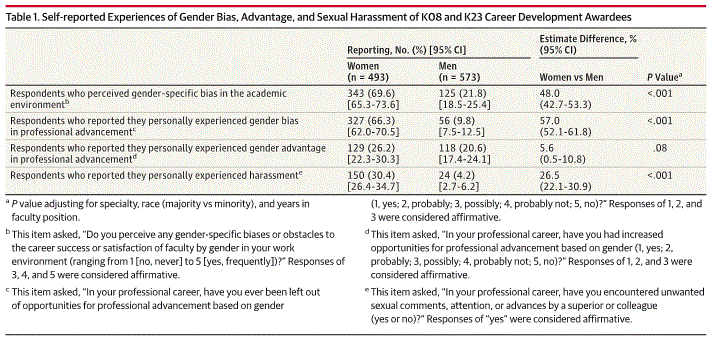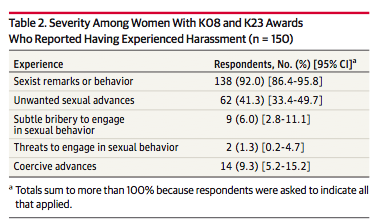Female Doctors Experience a Form of Inequality You Don't See On 'Grey's Anatomy'

By:
For female doctors, gender inequality goes far beyond the pay gap.
A recent survey conducted by the University of Michigan Medical School and published in the Journal of the American Medical Association found that an alarming 30 percent of female doctors surveyed had experienced sexual harassment in the workplace.
Sexual harassment in medicine.
The survey's authors asked 1,066 male and female physician-scientists, who had received career development awards from the National Institutes of Health between 2006 and 2009, questions about sexual harassment, gender bias, and gender advantage.
 American Medical Association/JAMA - jamanetwork.com
American Medical Association/JAMA - jamanetwork.com
While 30 percent of the women surveyed said they had experienced sexual harassment in their professional lives, only 4 percent of the men surveyed had experienced it. The survey also detailed specific types of harassment reported by respondents — including sexist remarks, threats, and sexual coercion.
 American Medical Association/JAMA - jamanetwork.com
American Medical Association/JAMA - jamanetwork.com
"We need to recognize the degree to which sexual harassment and gender inequality continue to be an issue in academic medicine," lead author Reshma Jagsi said in a press release. "Women who experience these types of harassment may be less likely to report these incidents if they feel they are unique and aberrational. Our data shows this is not an unusual situation and reflects a larger societal problem."
Gender bias.
Seventy percent of women also reported perceiving gender bias, while 66 percent of women said they had experienced gender bias personally. Men were far less likely to either perceive or experience gender bias — 22 percent of men surveyed said they perceived gender bias, while 10 percent said they had experienced it.
"The perception among many of us is that this type of behavior is a thing of the past," Jagsi added. "So it's sobering to see quite how many relatively young women in this sample reported experiences with harassment and discrimination."
The average age of the survey participants was 43, suggesting that many of those who reported harassment has experienced it in recent decades.
“I had a misperception that overt sexual harassment was largely a thing of the past, a vestige of another generation,” Jagsi told the Huffington Post.
Progress?
A study conducted in 1995, and cited by the University of Michigan researchers, reported that 52 percent of female academic medical faculty had experienced harassment over the course of their professional careers.
While the 12 percent decrease might seem like progress, significantly more women study and work in medicine than they did in 1995 — around half of today's medical students are female.
Jagsi told ATTN: in an email that while she didn't believe the studies could be compared directly, she had anticipated a larger decrease in sexual harassment reports.
"Many of the women who were on faculty in 1995 would have attended medical school when women were a very low proportion of the medical student body; the broader literature on workplace harassment suggests that harassment is more common when women are very under-represented in the workplace," Jagsi told ATTN: over email. "I had expected that the rates of harassment in the current study, which included women who attended medical school when women constituted 40 percent or more of the medical student class, would have been very low."
"To me, the finding that 30 percent of these women had experienced harassment in their careers suggests that we as a society haven't made as much progress as I would have hoped," she continued.
Why female doctors don't always speak up about sexual harassment.
"I think there is definitely a culture of silence [surrounding harassment in the medical profession]," Jagsi told ATTN: over email. "Women seem quite rationally reluctant to report these sorts of experiences for fear of being stigmatized, marginalized, or worse."
"I do think there is probably a false perception among many that sexual harassment is a thing of the past, and that these sorts of experiences are aberrational for working women today, especially those in powerful professions like medicine," she explained. "I think it’s important to recognize that such experiences aren’t yet rare, both to inform policy and to let women know so that they don’t blame themselves. "
